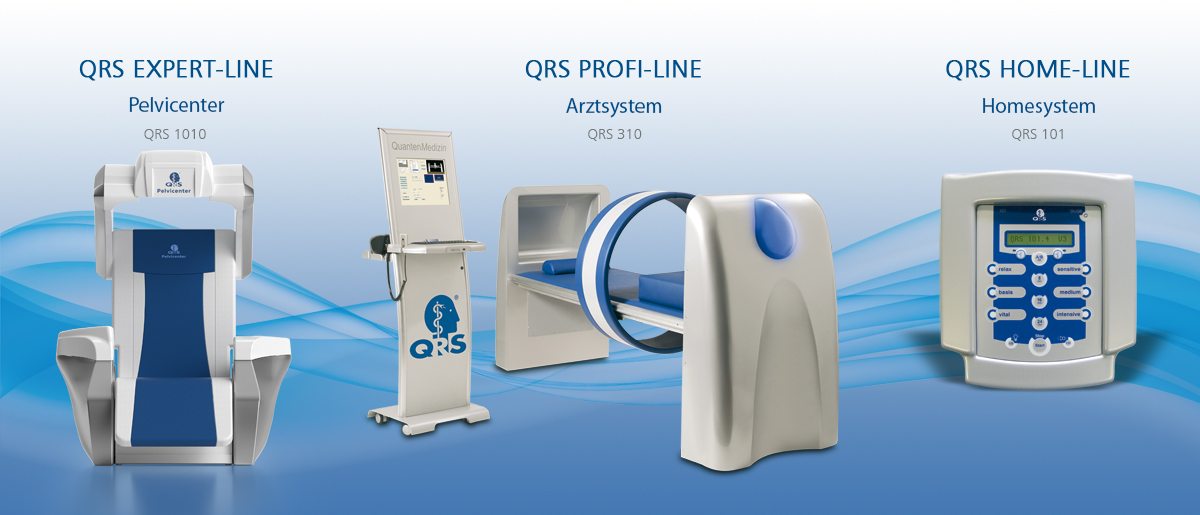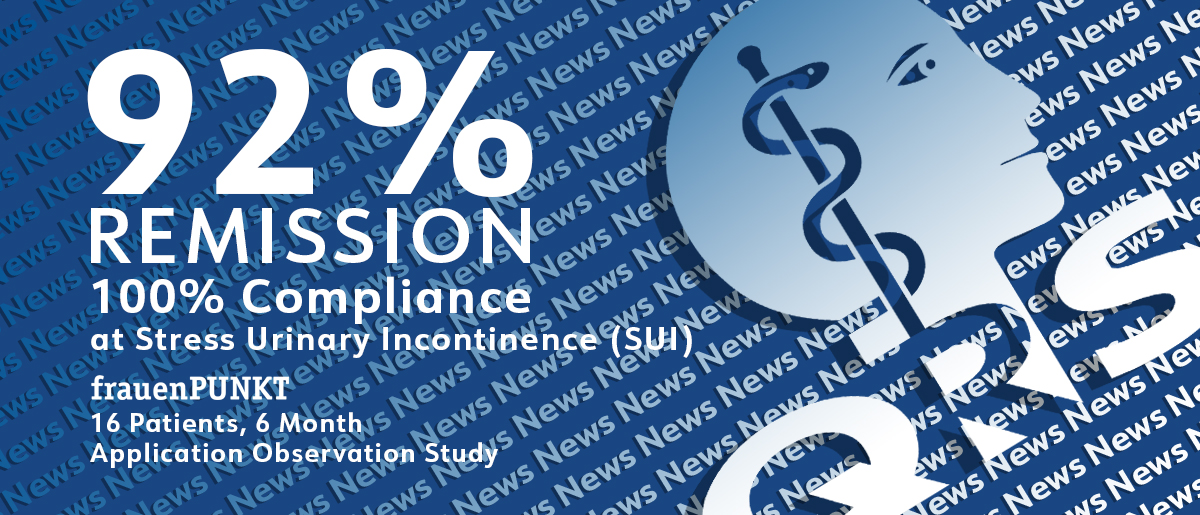
Application Observation Study
FrauenPUNKT clinic, Dr. Andrea Muller Reid
April 2019 to July 2020
16 Patients with Stress Urinary Incontinence (SUI)
A documented observation study was carried out in the Swiss Gynecology-Obstetric practice of „FrauenPUNKT“ (based in Altdorf, next to the Uri Cantonal Hospital). The observation study was carried out for a duration of 6 months on 16 female test persons who were diagnosed with Stress Urinary Incontinence (SUI) and who were treated with the QRS Pelvicenter. The average age of the subjects was around 50 years of age. The study was carried out under clinical conditions and was supervised by a study management team. The result of the study, which was surprising and at the same time convincing to all parties, is that there was a 92% remission rate.
Interview with the management of the „FrauenPUNKT“ women’s practice
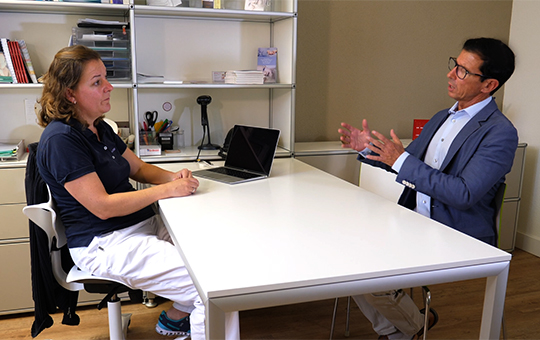
Dr. Andrea Müller Reid, gynecologist, head of the FrauenPUNKT practice, chief physician for gynecology at the Uri Cantonal Hospital, based in Altdorf Switzerland, in an interview with Mr Michael Gfrerer, QRS expert in rPMS (repetitive peripheral muscle stimulation)
Dr. Andrea Müller Reid und Herr Lawrence Reid are the managing directors of the renowned women’s practise FrauenPUNKT. They were kindly available to talk to us about the results of the observation study and their experiences. The interview took place on July 1, 2020 in the women’s practise of Dr. Müller Reid. The questions in this interview are asked by Mr Michael Gfrerer, the rPMS expert from QRS International AG.
Question:
Dr. Müller Reid, you were one of the first Swiss gynecology specialists who has invested in a rPMS system. May I ask you how satisfied you are with the system in treating Pelvic Floor Disorders?
Dr. Andrea Müller Reid:
We started using the system in October last year. First we focused on treating patients with Stress Urinary Incontinence. We are very satisfied with the various applications of the system and also we are extremely satisfied with the results of the therapy.
Question:
In addition to the formal Observation Study, you have monitored yourself the effectiveness of the Therapy on the 30 patients that you have treated. How satisfied are you with the results?
Dr. Andrea Müller Reid:
We treated about 30 patients, 16 of which were suffering from stress urinary incontinence. For those patients we realized a remission in 92% of the cases. This is a great success for us. We were expecting a success rate of only 75%, so we are of course very satisfied.
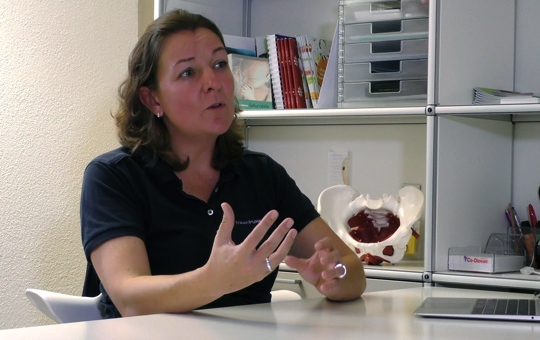
Dr. Andrea Müller Reid: We realized a remission in 92% of the cases. This is a great success for us.
Michael Gfrerer:
Wonderful, the result speaks for itself.
Dr. Andrea Müller Reid:
Yes, definitely!
Question:
Based on the good results that you have realized, are you recommending the therapy for all patients suffering from Stress Urinary Incontinence?
Dr. Andrea Müller Reid:
We highly recommend the therapy. Please note also that our long term results – we have been following our patients for a 6 month period – are extremely satisfactory. I think the rPMS therapy must be the first line therapy option before considering any other treatment options.
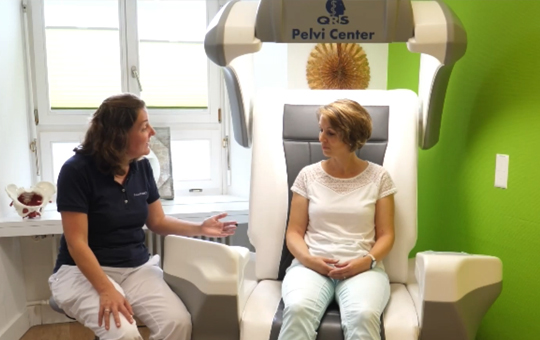
Dr. Andrea Müller Reid explains to one of the study test persons the importance of regular therapy in order to achieve optimal results.
Question:
What is your experience in relation to patient compliance? Were your patients satisfied with the Therapy method?
Dr. Andrea Müller Reid:
Very satisfied. Our experience is very clear. All our patients keep the appointments and complete all the required therapy sessions because they notice that something is happening. It is clearly a good therapy that brings something to the patients and that it is important for them.
Question:
Mr. Reid, you are a certified pelvic floor physiotherapist in FrauenPunkt clinic and you support Dr. Müller Reid with the pelvic floor muscle therapy. You were the main responsible for carrying out the Application Observation Study.
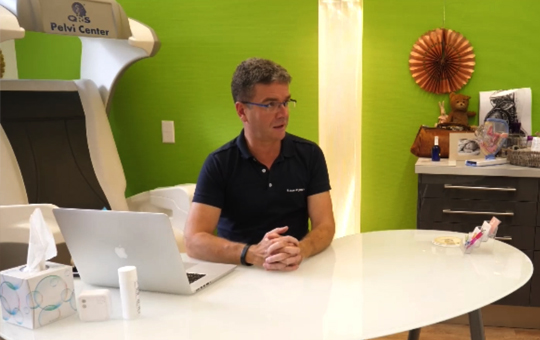
Mr. Lawrence Reid, certified Pelvic Floor Physiotherapist and supervisor of the Observation Study: The decision to invest in the QRS PelviCenter was mainly based on the intensity options of the therapy. For pelvic floor muscle training we need high intensities and only QRS PelviCenter is able to deliver those high intensities.
Lawrence Reid:
We started the study on October 1, 2019. Now we are at the beginning of July 2020. During this period we treated about 30 patients and recorded the details of each individual therapy session. About half of these 30 patients were suffering from Stress Urinary Incontinence.
Question:
Mr Reid, you have supported your wife Dr. Müller Reid in the project of investing in a rPMS system. You have carried out market research and have decided to invest in the QRS Pelvicenter
Lawrence Reid:
Dr. Müller Reid had first tried the Therapy two years ago. She showed serious interest in introducing the therapy in her clinic. We then looked at different suppliers. The decision in favor of the QRS PelviCenter was largely based on the intensity reach of the therapy. For us it was quite clear that we needed the high intensities that QRS-PelviCenter is offering in order to realize good results for our patients.
Question:
The high performance of the QRS PelviCenter is also necessary so that also obese patients can be treated effectively.
Lawrence Reid:
I would say that around a quarter to a third of our patients suffer from obesity. This means that already in our first therapy sessions we need to give therapy using high intensities. Only with the high intensities of QRS PelviCenter is it possible to have a muscle training which reaches deep into the pelvic floor. We are therefore very happy that we have the PelviCenter in our clinic and we also use it on a regular basis.
Michael Gfrerer:
We thank you for your time and we wish you a lot of success with the QRS Pelvicenter.
Published September 16, 2020

